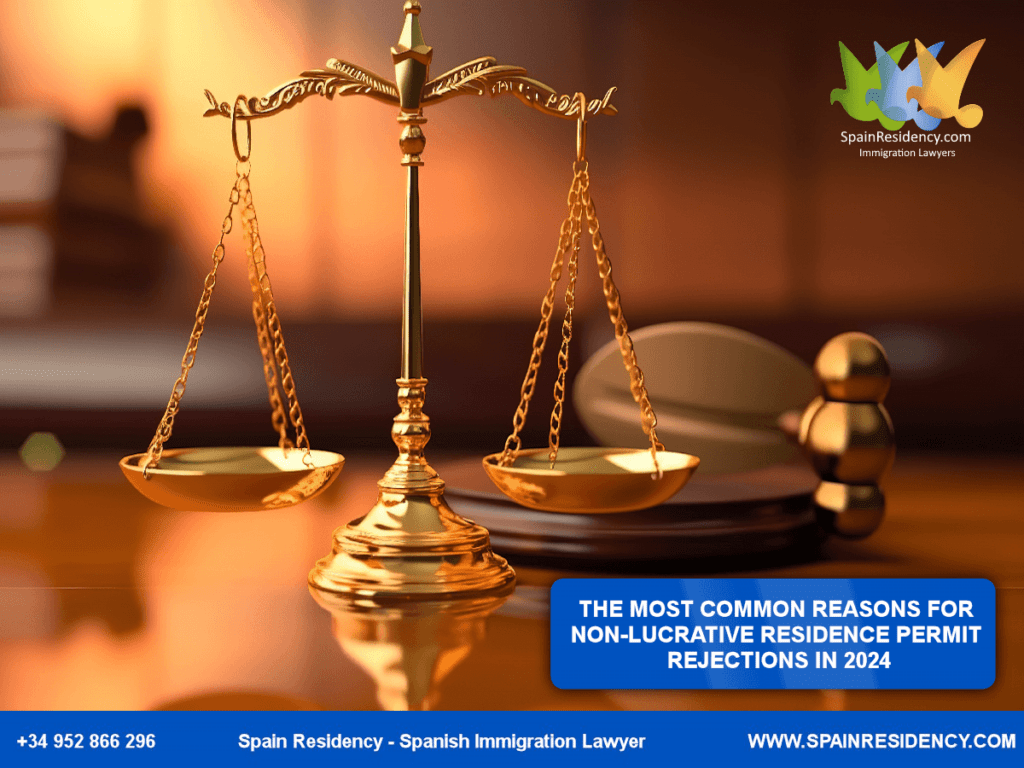By understanding and addressing the most common reasons for non-lucrative residence permit rejections in 2024, applicants can greatly improve their chances of securing a non-lucrative residence permit in Spain.
Over the years, we’ve encountered numerous cases where non-lucrative residence permit applications have been rejected by Spanish immigration authorities. To help reduce the likelihood of denial, we’ve compiled a list of the most frequent causes for application rejection.
Menu:
In this post we cover the following: (click any section to see its content)
The most common reasons for non-lucrative residence permit rejections in 2024:
-
- INSUFFICIENT REGULAR INCOME »
- INADEQUATE MEDICAL INSURANCE »
- LACK OF PROOF OF ACCOMMODATION »
- LACK OF A SCHOOLING PLAN »
- WEAK JUSTIFICATION FOR RESIDENCYINADEQUATE MEDICAL INSURANCE »
- FAILING THE EMBASSY INTERVIEWG PLAN »
- ALL TYPES OF RESIDENCY AVAILABLE IN SPAIN »
- SCHEDULE AN APPOINTMENT WITH A SOLICITOR »
INSUFFICIENT REGULAR INCOME:
Applicants must demonstrate they have sufficient income, whether from savings, pensions, or investments, to support themselves and their families while living in Spain for at least six months per year. Applications will be rejected if the applicant cannot show a minimum monthly income of €2.400 plus an additional €600 for each dependent.
INADEQUATE MEDICAL INSURANCE:
Medical insurance must be provided by a company operating in Spain and should offer coverage equivalent to that of the Spanish national healthcare system. Travel insurance or policies from a home country are not acceptable due to their many limitations.
Full details for medical insurance can been seen-here in a previous SpainResidency.com blog post.
LACK OF PROOF OF ACCOMMODATION:
Proof of accommodation is often scrutinized heavily by certain Spanish embassies. Although owning property in Spain is not a legal requirement, it is often viewed more favorably than renting. Some embassies, such as the one in Quito, Ecuador, implicitly expect applicants to demonstrate housing arrangements, even though this is not a formal part of the immigration law.
LACK OF A SCHOOLING PLAN:
For applicants with school-age children (ages 6-16 in Spain), a schooling plan is required. This often involves enrolling children in a private or international school and paying the necessary fees before submitting the application. Many applicants struggle with this upfront investment, particularly given the uncertainty surrounding the application’s approval.
WEAK JUSTIFICATION FOR RESIDENCY:
A key factor in the review process is whether the applicant’s intentions align with the residency requirements. If the authorities believe the applicant has no genuine desire to live in Spain but instead aims to gain easy access to the Schengen area, the application is likely to be rejected. Common red flags include:
- Family Incoherence: A single applicant leaving their family behind might signal to the authorities that they don’t plan to reside in Spain long-term.
- Employment Incoherence: Applicants must show they can maintain their business or job from abroad without needing to be physically present. This is straightforward for retirees or business owners but challenging for salaried employees who need to manage roles in their home country. Even in the remote work era, it can be tough to prove compliance with residency requirements, especially when it comes to permit renewals.
FAILING THE EMBASSY INTERVIEW:
Once the application is submitted, the applicant must attend an interview at the Spanish embassy. The goal is to verify the information provided and gather additional details, such as family ties, business connections, or reasons for choosing Spain. Surprisingly, some applicants fail this interview by providing vague or misleading answers. In some cases, applicants admit they don’t plan to live in Spain, but only want to use the residence permit as a travel document. Such admissions lead to immediate rejection.
ALL TYPES OF RESIDENCY AVAILABLE IN SPAIN:
- Golden-Visa Spain (residence in Spain by investment)
- Non-Lucrative visa Spain (Spanish visa non lucrative)
- Self-Employed visa Spain (self employed expats in Spain)
- Digital-Nomad visa Spain (remote worker in Spain)
Please see-here our video-blog with options and legal-advice to obtain residency in Spain.
Remember that immigration procedures and immigration regulations change regularly, so it’s crucial to stay updated with the latest information from reliable sources. If you have specific questions or concerns about your situation, it’s advisable to consult with immigration authorities or legal professionals specializing in immigration matters, to do this, please click-here »
DO YOU REQUIRE ASSISTANCE TO APPLY FOR RESIDENCE OR CITIZENSHIP IN SPAIN?
We are a Spanish Solicitor and assist our clients with all types Spanish legal processes.
Permanent residency is obtained after 5 years of Spanish Residency through Self-Employed Residency, Digital-Nomad, Non-Lucrative Residency or Golden-Visa. This followed by 5 years as a permanent resident in Spain and means you can then obtain Spanish Citizenship with a Spanish Passport.


